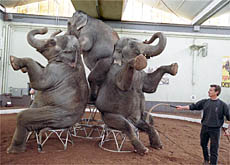Senate takes measure of cruelty to animals

The Senate is on Wednesday set to discuss an overhaul of Switzerland’s animal protection law.
Parliamentarians are considering a government proposal for minor revisions to the 25-year-old legislation, as well as a people’s initiative for wholesale reform.
All sides agree that the current law, which dates from 1978, needs to be updated.
The government says better training for people who deal with animals and improving enforcement of the law is sufficient. But animal welfare groups want far-reaching reform, and are threatening to force a nationwide vote on the issue.
Urs-Peter Müller of the Federal Veterinary Office says a radical change to the existing law is unnecessary. “We do not [need to] modify the level of the protection itself because that level is internationally still very [high],” Müller told swissinfo.
“Swiss animals are not different from French or German animals so why should we have a stronger protection level?” he added.
Formidable
The government has been criticised for kowtowing to the farmers’ lobby – a formidable political force – which does not want the cost or inconvenience of tougher regulations.
Animal welfare groups – which have more than 500,000 members across Switzerland – say the government’s proposals prove it is not serious about improving the treatment of animals.
“We want a higher level of protection in the law,” said Roman Weibel, head of a cattle protection group based in St Gallen.
“[For example], in the transport of cattle for slaughter we [want] a journey limit that is under the six or eight hours currently allowed in Switzerland.”
Suffering
He added that the groups were also seeking a ban on experiments on animals which cause extreme suffering.
Swiss Animal Protection (SAP), the largest of the animal welfare groups, stepped up the pressure in July when it submitted a people’s initiative – the first step to forcing a nationwide vote on the issue.
The initiative “For a Modern Protection of Animals (Animal Protection – Yes)” seeks to have animal protection rules enshrined in the constitution.
It also wants to stop the import of all animal products that do not conform to Swiss animal protection standards.
But the government has already rejected the initiative, saying that many of its measures, such as the import ban, are just not viable.
Violation
“This rule is a violation of World Trade Organization laws,” said Müller from the Federal Veterinary Office. “Switzerland is a member of the WTO and we cannot violate these rules without very heavy consequences.”
The groups’ proposals would also ban the import of kosher and halal meat for Jews and Muslims, which is produced by ritual slaughter.
Since that practice is banned in Switzerland, Müller said an import ban would violate the European Treaty on Human Rights. Experts also say that it would violate religious freedoms.
A parliamentary science commission in September recommended that parliament reject the people’s initiative. But it did make some suggestions which went further than the government’s proposal, such as allowing experiments on animals only when no alternative was available.
Castration
Another controversial point, the castration of young male pigs without anaesthetics – currently legal in Switzerland – should also be phased out by 2009, it said.
The commission added that its suggestions could be considered as an indirect counterproposal to the SAP initiative.
But the SAP, and the other animal welfare groups, say they do not accept either of the proposals.
“It’s a big problem that the new law also permits cruelty against some animals. In a modern country like Switzerland you can’t have cruelty to animals,” said Weibel.
swissinfo, Isobel Leybold-Johnson
The Senate is debating a revision of the 1978 animal protection law.
The government says better enforcement of the law and education about animal protection is sufficient.
Animal welfare groups want wider reforms, including shorter journey times for transporting livestock and a ban on imports from countries which don’t conform to Swiss rules.

In compliance with the JTI standards
More: SWI swissinfo.ch certified by the Journalism Trust Initiative












You can find an overview of ongoing debates with our journalists here . Please join us!
If you want to start a conversation about a topic raised in this article or want to report factual errors, email us at english@swissinfo.ch.